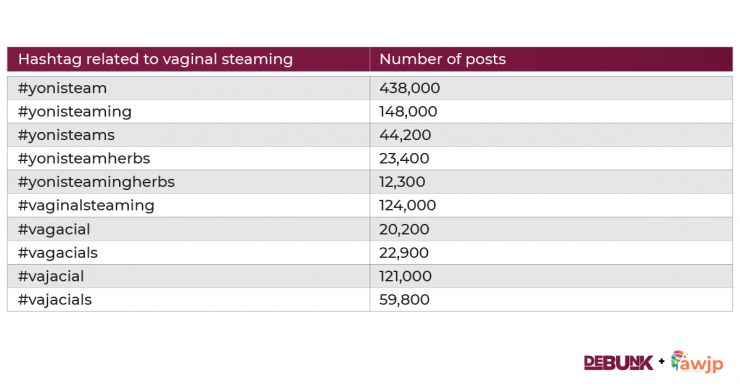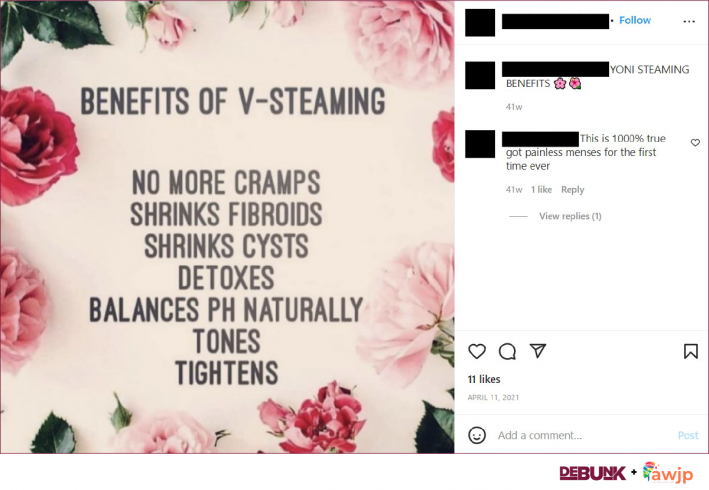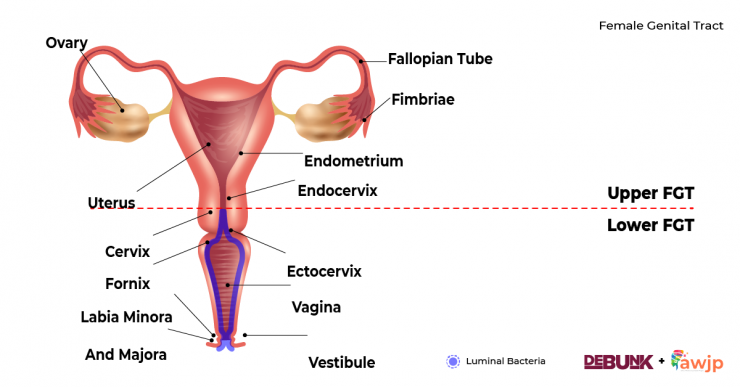For KSh1500 and 30 minutes of your time, you can get a VSteam anywhere in Nairobi. A V-Steam is also known as a “yoni steam” or “vagina steam”. It entails steeping selected herbs into a bowl of boiling water and sitting over it with your groin area exposed to the steam.
This service may also be marketed under “vagacial” or “vajacial”. A search of hashtags on Instagram reveals that all these terms have millions of posts promoting various services and practices.

Debunk examined the Instagram pages of two Kenyan spas’ and discovered almost 100 posts collectively promoting the practice and making unsubstantiated claims about the benefits of vaginal steaming including restorative and healing of all types of ailments that women face.

But how reliable are these claims? And, more importantly, is vaginal steaming safe?
Debunk asked a few experts in both conventional mainstream medicine and traditional herbal medicine for their thoughts on the claims about vaginal steaming made by these spas and others like it on Instagram. The following is their advise on some of the claims made about vaginal steaming.

NO: It is not safe to sit over steam for 15 to 30 minutes.
The first concern is related to the fundamental principles of vaginal steaming. The steaming contains herbs such as motherwort, calendula, lavender, rosemary, rhizoma, red raspberry leaf and chamomile. The external parts of the female genitalia and the thighs are then exposed to the steam.
Exposing the groin area to the steam can be risky. “You can actually get burns from steaming because that’s hot air coming into your vagina so you can get burns instead,” says Dr Karen Muthembwa, a health blogger and resident Obstetrics and Gynaecology, University of Nairobi.
Martin Onyalo Odhiambo, who has been practicing herbal medicine for 28 years and is a lecturer on plant medicine at the National Museum of Kenya, agrees that steaming can be dangerous.
“Vaginal steaming can last about 3-5 minutes. If you do it for longer than that you need to take breaks in between,” he said.
NO: Vaginal steaming does not freshen, cleanse or ‘detox’ the vagina.
Detox has become a buzzword on the Internet but its definition is ambiguous. However, a general definition of this term is ‘a process or period of time during which one abstains from or rids the body of toxic or unhealthy substances.’
To detox the body, diets and other remedies are frequently prescribed. In this case, it is claimed that the detox is accomplished by steaming a woman’s genitals.
“Because the vagina is a self-cleaning organ, the whole idea of trying to do it via vaginal steaming is unnatural. Although they say now this is a natural form of detoxing. It’s not; it doesn’t make sense,” said Dr. Muthembwa.
The vaginal cavity cleans itself naturally by making mucus. Blood, semen and vaginal discharge are washed away by the mucous. It also has a natural pH of between 3.8 – 4.5, making it acidic. Lactobacilli, a type of ‘good’ bacteria, maintains this acidity.
NO: Steaming will not improve your mood, relieve irritability (PMS) or induce deeper sleep.
PMS also known as premenstrual syndrome is a very common condition that affects more than 90% of menstruating women. This condition affects a woman’s emotions, physical health and behaviour on specific days of her menstrual cycle, usually just before her menstruation. Though there is no single cause of PMS, doctors are certain it has something to do with the hormone interactions in a woman’s hypothalamus – these hormones are released by the ovaries. The hypothalamus is a region of the brain that produces hormones, including those that regulate women’s menstrual cycles.
According to Dr. Yoni Biko, resident of Obstetrics and Gynaecology, University of Nairobi says that there is nothing that can be done locally on the vagina to help alleviate some of the PMS symptoms. “PMS has to do with the vagina itself. There is no empirical evidence to support any alleged benefits of vaginal steaming. The vagina is not meant to be steam-cleaned. The only difference is that because you are applying warm steam to your vagina, it might help increase blood flow to it. You may get the same effect from taking a warm bath to ease PMS symptoms such as cramps, bloating and exhaustion.” he says.
Dr Biko recommends the following natural remedies to alleviate PMS symptoms;
Reduce bloating and the sensation of fullness by eating smaller, more frequent meals.
To reduce bloating and fluid retention, limit your intake of salt and salty foods.
Choose complex carbohydrates-rich foods, such as fruits, vegetables and whole grains.
Choose calcium-rich foods
Caffeine and alcohol should be avoided.
Dr Biko advises those experiencing severe PMS symptoms to consult a doctor who may prescribe one or more premenstrual syndrome medications.
NO: You cannot lower your pH by steaming yourself.
A healthy vaginal pH ranges between 3.8 and 4.5 indicating that it is moderately acidic. As previously explained, the vagina maintains this balance on its own via a ‘good’ bacteria, Lactobacilli. This environment protects the vagina from infections and inflammation; anything that upsets the balance can lead to bacterial or yeast infections. A foul or fishy smell, unusual white, grey, or green discharge and vaginal itching or burning when you are urinating are all signs that your vagina is out of balance.
“You can’t steam yourself into a lower pH,” says Dr. Biko dismissing claims that vaginal steaming can balance the pH of the vagina.
NO: Vaginal steaming will not reduce cramping during your menstrual cycle or irregular menstruation cycles (short or long cycles).
Menstruation is the monthly period during which the uterine lining is shed if pregnancy has not taken place. To accomplish this, the uterine walls contract in order to expel this lining. The hormone that causes these contractions can exist in higher levels among some women, causing them physical pain. Menstrual cramps is a type of pain that many women experience when they menstruate.
“Applying a heating pad or hot water bottle on the lower abdomen can help with cramps. The heat relaxes the uterine muscles, increasing blood flow and easing pain. Steaming your vagina will not relieve your menstrual cramps,” advises Dr Muthembwa.
In contrast, irregular periods are defined as those that do not occur after every 28 days or so. For example, if your period occurs after every 21 days (too short) or after every 35 days (too long) – you have an irregular period. Some of the factors that can cause irregular periods include stress, birth control pills, fibroids, endometriosis.
Because there are so many possible causes for an irregular period, the only way to get help is to be diagnosed by a general practitioner or gynaecologist. Dr Muthembwa also also states that vaginal steaming will not fix irregular periods.
NO: Yoni steaming cannot improve fertility, induce pregnancy or unblock fallopian tubes.

Infertility can be caused by a number of factors such as hormonal imbalances that prevent ovulation, abnormal menstrual cycles, obesity, being underweight, having low body-fat content due to extreme exercise.
Other factors which can cause infertility include endometriosis, a non-cancerous condition where tissue similar to the lining of the womb starts to grow in other places such as the ovaries and fallopian tubes and causes extreme menstrual pain and severe cramps can also cause infertility. Structural problems such as pelvic inflammatory disease can also lead to blocked fallopian tubes and cause infertility.
All these conditions necessitate different interventions to address them such as surgery to remove abnormal tissue blocking the fallopian tubes, hormonal treatments to stimulate egg growth, oral medications to reduce excessive levels of prolactin that may be inhibiting ovulation, change in diet and exercise regimen for women who are overweight or engage in excessive exercise regimens. Vaginal steaming cannot redress these problems.
“You cannot unblock fallopian tubes through steaming. This requires surgery. You cannot remove cysts through steaming either! The vaginal area is naturally warm. So if steaming was one way of inducing pregnancy, then women would be getting pregnant all the time,” says Dr Muthembwa urging women to seek treatment for the underlying cause of their infertility rather than following social media trends like steaming. “They may end up causing more damage to their chances of having a baby if they participate in such fads,” she adds.
NO: Steaming cannot help women with fibroids, cysts, PCOS, endometriosis, UTIs, yeast infections or genital warts.
Fibroids are non-cancerous growths that appear in the uterus on their own. Cysts form in one or both ovaries as a result of Polycystic ovary syndrome. Urinary tract infections affect the urinary system which include the kidneys, the bladder, urethra and other such structures which are separate but close to the reproductive system. Yeast infections are caused by an overgrowth of the Candida fungus, whereas UTIs are caused by bacterial infections in the urinary tract. Genital warts are a type of sexually transmitted infection that appears on or near the genital or anal area and is typically caused by the human papillomavirus or HPV.

According to Dr Biko, vaginal steaming has no effect on any of these conditions because they occur deep inside the body and not on the vagina. “At the end of the vagina, there’s the cervix that closes off the upper female genital tract (FGT) which includes the uterus, the fallopian tubes and the ovaries. This means there is no real communication between the labia and the uterus for example. It’s not an open tract that goes all the way with no obstructions. So when you do something topically on the labia and skin of the vagina, it cannot go up to affect the uterus or fallopian tubes. Steaming has no effect on fibroids, PCOS, or anything inside the vagina or uterus”, says Dr Biko.
NO: Steaming does not increase blood flow to the uterus or strengthen it (treat uterine prolapse).
Uterine prolapse occurs when the muscles and tissue in your pelvis weaken. This allows your uterus to drop down into your vagina. Leakage of urine, fullness in your pelvis, bulging in your vagina, lower-back pain, and constipation are all common symptoms. Floor exercises to strengthen pelvic muscles can sometimes be beneficial. However, in most instances, medical treatment such as surgery to remove the uterus or the insertion of a Vaginal pessary (a device that holds the uterus in place) are necessary. If left untreated and in severe cases, uterine prolapse can cause obstruction of the kidneys or urinary retention (inability to pass urine leading to kidney damage or infection).
“There is no scientific evidence that vaginal steaming aids can somehow help reduce vaginal prolapse. Since it’s a muscle condition, steaming is not going to work. Instead, pelvic floor exercises, pilates and physiotherapy will help. In fact, there is little scientific evidence behind many of the claimed benefits of vaginal steaming such as tightening your vagina, reducing menstrual cramps, or “optimizing life’. ” according to Dr Muthembwa who advises women to seek medical advice to determine the cause of their prolapse.
NO: Steaming will not help reduce vaginal odour and abnormal discharge.
The vagina is home to billions of bacteria, the composition of which changes on a daily, if not hourly, basis. The groin area also has a lot of glands so the vagina, cannot be odourless. A tangy or fermented smell, according to Dr Muthembwa, indicates the presence of good bacteria such as Lactobacilli.
It is acceptable to have a coppery, metallic odour usually after or during menstruation or after sex. However, if the smell persists after menstruation and is accompanied by itching and discharge, it could be a sign of something more serious. “Always seek medical attention in such cases,” advises Dr Muthembwa.
A strong, sweetish and earthy smell should not be a cause of concern. This is due to a change in the vaginal pH levels which is a constantly changing bacterial ecosystem.
A urine buildup in your underwear or around your vulva could cause an odour similar to bleach or ammonia which is commonly described as ‘fishy’ “Urine smelling strongly of ammonia is a sign of dehydration. It can also be a sign of bacterial vaginosis,” Dr Muthembwa says.
Sweat causes a smoked herbal earthy scent in your groin. There are two types of sweat glands in our bodies— apocrine and eccrine. The eccrine glands produce sweat to cool your body whereas the apocrine glands react to emotions. These apocrine glands are found in your armpits and your groin. When you are stressed or anxious, the apocrine glands discharge a milky fluid. This fluid has no odour on its own. However, when this fluid comes into contact with the abundant vaginal bacteria on your vulva, it can produce a pungent odor, according to Dr Muthembwa.
Trimethylamine, a chemical compound that is present when there is an overgrowth of anaerobic bacteria in the vagina is the cause of the dead fish vaginal odour. It can cause bacterial vaginosis and is also responsible for Trichomoniasis, one of the most common curable sexually transmitted infections that is easily treatable with a course of antibiotics. “A trichomoniasis infection can be quite smelly. The smell is a more pronounced fishy odour than bacterial vaginosis,” explains Dr Muthembwa.
She advises women not to steam to change their vaginal odour. “The steam almost never enters the vagina. Steaming would only have an effect on the vulva and could potentially scald the skin. Unfortunately, women frequently confuse the vulva and vagina. They have been taught that the genital area is a taboo, dirty place. Steaming can cause a slight change in odour or even worsen it because you’re mixing everything together, including the blends in the steam which changes the bacterial balance in the vagina,” explains Dr. Muthembwa.
NO: Steaming will not hasten recovery after childbirth.
Childbirth can have a number of side effects on the body. Everything from abdominal pain to constipation, haemorrhoids, vaginal bleeding and discharge and sore nipples breasts and pain from stitches.
Dr Muthembwa advises reporting any unusual symptoms to your doctor, but that there is no need for any additional measures. “The body heals itself. The vagina is a self-healing organ. As a result, it heals itself fully and very well,” she explains.
NO: Vaginal steaming is good for women experiencing menopausal hot flashes.
Hot flashes are a very common side effect of menopause. They are a sudden wave of heat that moves through the body with no apparent reason. Sweating and palpitations are possible side effects.
Another symptom of menopause is vaginal dryness which can cause irritation, burning, and pain during sexual activity. After and around the time of menopause, the body produces less estrogen, a hormone that aids in the maintenance of vaginal lubrication, elasticity, and thickness. Low levels of estrogen can cause thinning, drying, and inflammation of vaginal walls. This is known as vaginal atrophy. Estrogen levels can drop after childbirth, with breastfeeding, during cancer treatment, or use of anti-estrogen drugs. Other non-hormonal factors that can cause dryness of vaginal tissue include cold and allergy medications as well as some antidepressants.
Vaginal steaming does not address these factors. “Steaming does not increase lubrication. Steaming causes sweating which is not always the same thing as lubrication, so this will not work,” Dr Muthembwa says.
NO: Vaginal steam cannot remove blood clots left or old sperm.
Steaming and douching can cause more damage than good. “All douching does is remove the natural bacteria and let one of these abnormal bacteria grow and cause more trouble,” explains Dr. Muthembwa.
The body requires no assistance to drain itself of any blood remaining after periods or getting rid of old sperm after sexual activity. “The steam doesn’t even really get up to your uterus. The body drains itself. It happens naturally,” she explains.
NO: Steaming cannot help with vaginal itch?
Irritating substances, infections, or menopause can all cause itching near the vagina or vulva. It can also be caused by certain skin disorders or sexually transmitted diseases (STDs). In very rare cases, vaginal itching can develop as a result of stress or vulvar cancer.
The pain and itching usually goes away after 3-4 days. If it does not, consult your gynaecologist. Steaming to reduce the itch, according to Dr Muthembwa, may be more dangerous. “Because of the wetness, it may even worsen the itching,” she explains.
Dr Biko believes that steaming may provide temporary relief if the herbal mixture has some anti-inflammatory properties and if the itch is on the surface of the skin. “This is not a solution if the itch is caused by bacterial infection or another form of infection where steaming is not effective,” he adds.
NO: Steaming cannot help resolve painful sex.
Endometriosis, pelvic inflammatory disease, uterine prolapse, retroverted uterus, uterine fibroids, cystitis, irritable bowel syndrome, pelvic floor dysfunction, adenomyosis, haemorrhoids and ovarian cysts, are all causes of painful sex.
Vaginismus, or spasms of the vaginal wall muscles can also cause painful sex. This pain can occur near the labia or deep within the vagina.
“Vaginal steaming would only help with wetness, but it does not increase lubrication which is necessary for painless sex. And because the causes of painful sex are very many, steaming would not necessarily result in any improvement,” Dr. Muthembwa explains.
NO: Vaginal Steaming has an effect on cervical mucus.
Cervical mucus is the discharge of fluid or gel-like material from the cervix. The thickness and amount of cervical mucus changes throughout a woman’s menstrual cycle. This is due to the fact that hormone levels fluctuate throughout the menstrual cycle. Hormones cause mucus glands in the cervix to produce the discharge.
Normal vaginal discharge consists primarily of water and vaginal cells. “The colour of the secretions may vary from clear, to white, to off-white, depending on the time/course of the menstrual cycle and the colour may the consistency of the secretions may vary from thin and watery to elastic and stringy to thick and gooey,” explains Dr Muthembwa.
Cervical mucous cannot be produced artificially or caused to be produced externally. “Cervical mucus is produced by glands in the cervix, not from steaming from below,” said Dr Muthembwa.
No: Steaming can help release “cellular memories of sexual and physical traumas’.
Sexual trauma is commonly associated with rape and molestation. Victims who go through the harrowing ideal may develop aversion to any sexual activity.
Vaginal steaming is unlikely to aid in the treatment of such traumas. “Not all. I guess they mean rape when they talk of physical trauma? Absolutely not,” says Dr Muthembwa.
The conventional method for dealing with such a situation would be therapy.
NO: Yoni steaming is safe for contraceptive-using women.
Condoms, oral contraceptive pills, Intrauterine Devices (IUD), contraceptive implants, contraceptive injections, emergency contraception pills (The ‘Morning After’ Pill), contraceptive rings and diaphragms are all options for women who want to start using contraception to prevent pregnancy.
These methods of contraception do not necessitate any additional actions on the part of the woman. “Women on contraception are fine, so they don’t need anything else.” In fact, contraceptives can help you have a normal cycle and discharge,” Dr Muthembwa explained.
Furthermore, the steam’s water may have unpleasant interactions with the materials of any physically inserted contraceptive methods, such as IUDs.
Yoni steaming is not recommended for women who have had miscarriages.
Miscarriage occurs when a baby dies in the womb within the first 20 weeks of pregnancy, and it can occur even before a woman realizes she is pregnant. Though there are several causes, the majority are genetic in nature. Miscarriages are fairly common, but this does not imply that the woman will never be able to carry a child to term.
Conclusion.
Some of the products promoted on these Instagram accounts are most likely aphrodisiacs disguised as health benefits. According to conventional medicine, vaginal steaming is understudied and may have unknown side effects, as well as the fact that none of its benefits have been scientifically studied.
Traditional herbal medicine must not be overlooked. Martin Onyalo Odhiambo is the program coordinator for the Trust for Indigenous Culture and Health (TICAH), a feminist organization that works to strengthen the connections between health and cultural knowledge, practices, beliefs, and artistic expression. Traditional knowledge of disease treatment is important in our Kenyan and African societies, and it has been passed down from generation to generation, just as Mr Odhiambo apprenticed in herbal medications under his grandparents. Vaginal steaming can be done in some cases, according to his teachings, but it can be dangerous, especially if done for as long as is usually recommended – 15 to 30 minutes is too long.
If a woman is concerned about her vaginal health, Dr Muthembwa advises her to follow conventional wisdom. While some women enjoy vaginal steaming and believe it relieves symptoms associated with periods, childbirth, or other feminine discomforts, there is no scientific evidence to support its efficacy.
“Everyone is unique. If it works for you, keep doing it. But understand the consequences of your actions. It’s just like how we say we eat healthily. However, there are people who will eat unhealthily for their entire lives and be perfectly fine. But how do you know if it will work for you? It’s only a few people who may suffer no repercussions,” she explained.
Once again, the vaginal organ is a self-cleaning organ. If you’re worried about its health, wash it with your hands only (no face cloths, scrubbers, or antiseptics) using mild unscented and hypoallergenic soap (unscented, mild, and colorless) and pat the area dry. Save the steaming for your face!
“This article was produced by the Africa Women’s Journalism Project (AWJP) in partnership with Article 19, Meedan and the International Center for Journalists (ICFJ).”